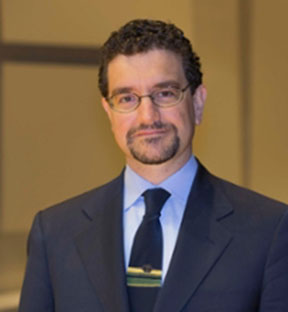Davide Ceriani
Davide Ceriani
Davide Ceriani
Associate Professor of Musicology. Coordinator of the Following Areas: Western Music History, Music Appreciation, and World Music
Biography
Prior to working at Rowan University, Dr. Ceriani spent two years (2011-13) as a Mellon Postdoctoral Fellow in the Department of Music at Columbia University. He received his Ph.D. in Musicology from Harvard University in May 2011, earned his Laurea (cum laude) at the University of Florence in 2003, and graduated in saxophone at the Conservatory of Bologna in 1999. Before embarking on his graduate studies, he was a visiting student at the University of Saint-Denis, Paris 8 (1997-1998) and at Smith College (2001-2002), and he worked as an intern librarian at the Bibliothèque nationale de France (2000). Throughout the 1990s and early 2000s, Dr. Ceriani also performed extensively as a saxophone player in Italy, France, and the United States. Dr. Ceriani’s two main areas of research are the reception of Italian opera in the United States from 1880 until 1940 (with a special focus on how opera defined Italian cultural identity in America during the years of mass migration) and music in Italy during the interwar period (with special focus on the intersection of politics, aesthetics, criticism, and historiography). His writing has been published in Nineteenth-Century Music Review, Journal of Music Criticism, and in various edited collections.
Education
- Ph.D. Harvard University
- M.A. University of Florence, Italy
- B.M. Conservatory of Bologna, Italy
Research Support
- Library of Congress (John W. Kluge Center Fellowship): https://www.loc.gov/programs/john-w-kluge-center/scholars-in-residence/past-resident-scholars/a-c/
- The American Musicological Society (Ora Frishberg Saloman Fund): https://www.amsmusicology.org/page/Saloman_Winners
- The Society for American Music (Adrienne Fried Block Fellowship): https://www.american-music.org/page/BlockFWP
- Rowan University (Seed Grant): https://banner9.rowan.edu/ords/ssb/!ROWANSSB.ROWAN_ANNOUNCER.p_view?sub_id=14370
- Rowan University (Frances R. Lax Fund): https://sites.rowan.edu/academic-affairs/facultycenter/grantsawards/laxpages/2015Lax.html
List of Publications (Selection)
- “Italian Instrumental Music as Fascist Propaganda in the United States During the Interwar Period: The View from the Ministero degli affari esteri and from the press,” in Music and Institutions in Fascist Italy, eds. Roberto Illiano and Luca Lévi Sala (Turnhout: Brepols Publishers, 2024), pp. 3-37.
- "L'arrivo dell''Italian Contingent': gli inizi di Giulio Gatti-Casazza al Metropolitan Opera House," in Migrazioni teatrali e artistiche tra Europa e Americhe, eds. Gianni Cicali, Elena Mazzoleni, and Anna Maria Testaverde (Rome: Bulzoni, 2024), pp. 243-255.
- "Lorenzo Da Ponte's Legacy: Italian Opera, Singers, and Identity in New York City in the 1840s and 1850s," in Italian Opera in the United States, 1800-1850: At the Origins of a Cultural Migration, eds. Giuseppe Gerbino and Francesco Zimei (Lucca: Libreria Musicale Italiana/LIM, 2023), pp. 189-209.
- "Vittorio Rieti," in Intellettuali in fuga dall'Italia fascista. Migranti, esuli e rifugiati per motivi politici e razziali, ed. Patrizia Guarnieri (Florence: Firenze University Press, 2023), pp. 1-22. Available at https://intellettualinfuga.com/it/ (Italian) and https://intellettualinfuga.com/en/ (English).
- “Cleofonte Campanini negli Stati Uniti,” in Cleofonte Campanini da Parma al Nuovo Mondo, eds. Federica Biancheri and Giuseppe Martini (Parma: Casa della Musica, 2019), pp. 71-81.
- “‘Under the Florentine Sky, with the Clarity of Latin Thought’: Italian Music Critics and the 1934 Meeting of the International Society for Contemporary Music,” in Music Criticism, 1900-1950, eds. Jordi Ballester and German Gan Quesada (Turnhout: Brepols Publishers, 2018), pp. 421-440.
- “Oreste and Alberto Bimboni, Florentine Musicians in America: Their International Career and How They Influenced the American Musical Scene,” in Winona, “All-Indian Opera” by Florentine-American Composer Alberto Bimboni (1882-1960) and the Italian Contribution to the Indianist Movement in American Music Culture, ed. Aloma Bardi (Ann Arbor: ICAMus, 2018), pp. 6-19. Available at http://www.icamus.org/en/depth/ (Co-authored).
- “Romantic Nostalgia and Wagnerismo During the Age of Verismo: The Case of Alberto Franchetti,” Nineteenth-Century Music Review, Vol. 14, Issue 2 (Cambridge: Cambridge University Press, 2017), pp. 211-242.
- “Mussolini, la critica musicale italiana e i festival della Società Internazionale di Musica Contemporanea in Italia negli anni Venti,” Journal of Music Criticism, Vol. 1, Issue 1 (Lucca: Centro Studi Opera Omnia Luigi Boccherini, 2017), pp. 17-71. (“Mussolini, the Italian Music Critics, and the Meetings of the International Society for Contemporary Music in Italy During the 1920s.”) Available at https://www.luigiboccherini.org/jmc-volume-1-2017/
- “The Reception of Alberto Franchetti’s Work in the United States,” in Alberto Franchetti (1860-1942): l’uomo, il compositore, l’artista, eds. Richard Erkens and Paolo Giorgi (Lucca: Libreria Musicale Italiana/LIM, 2015), pp. 271-299.
- “Opera as Social Agent: Fostering Italian Identity at the Metropolitan Opera House During the Early Years of Giulio Gatti-Casazza’s Management, 1908-1910,” in Music, Longing, and Belonging: Articulations of the Self and the Other in the Musical Realm, ed. Magdalena Waligórska (Newcastle upon Tyne: Cambridge Scholars Publishing, 2013), pp. 114-134.
For additional information, see:
